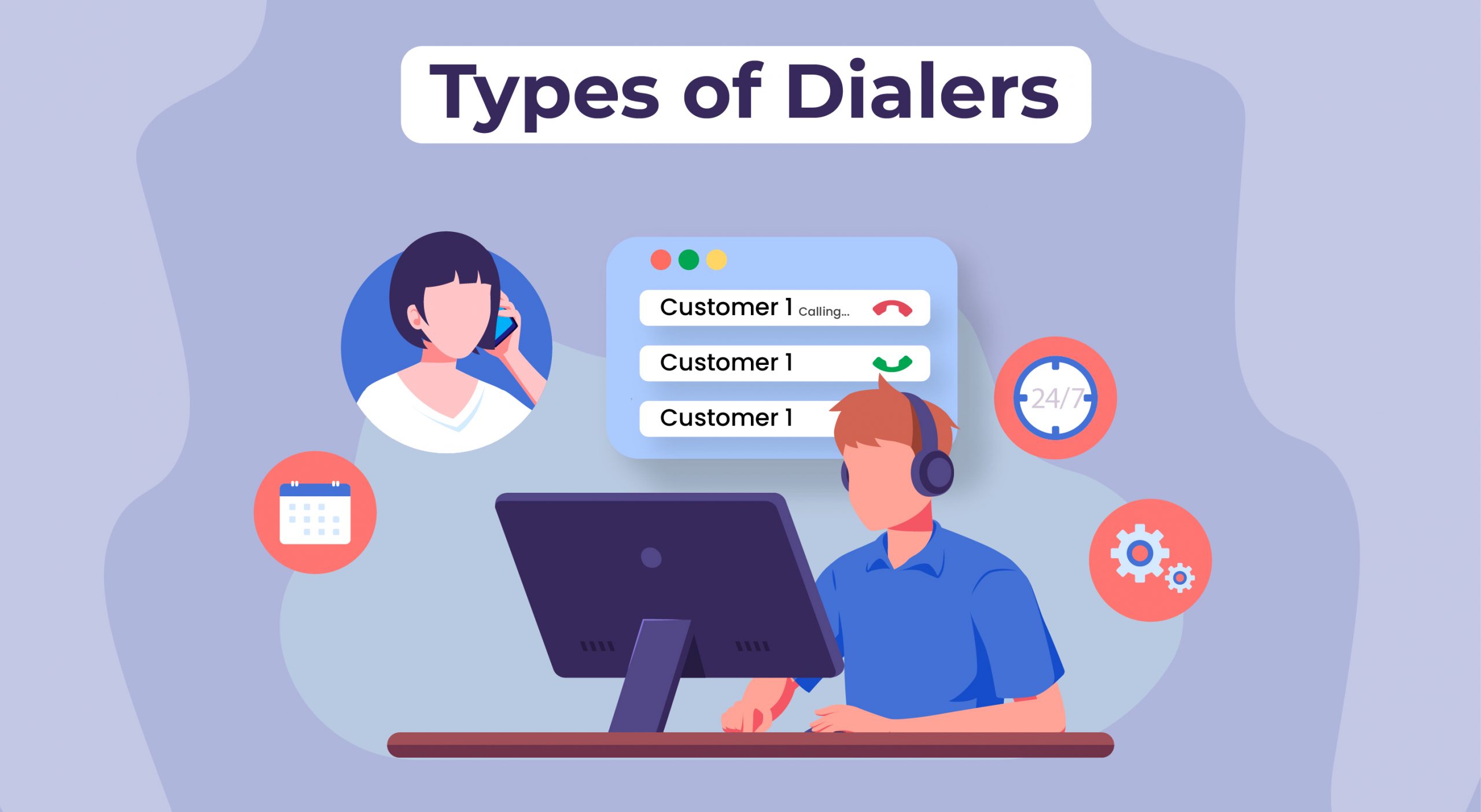Dialer is an essential call center software that automates the contacts navigation and the dialing process. This reduces a lot of time as in call centers vast volumes of calls are to be made and dialing and navigating connections if done manually will be really time-consuming. It can also broadcast recorded messages through interactive voice responses (IVR) push notifications. It can route the call to a suitable agent, leave voice messages, process the data play music, and move to the following contact. This brings more productivity to the call center. As you may have guessed there are many types of dialers and the question is which one to choose and what's the difference between them.
Dialers aren't only used by the call center or customer service departments it is also used by sales and marketing teams for connecting with their customers and leads. The sales team gathers data about the customer, loads the contact list on the dialer, and then reaches out to their large customer base. Also, some dialers have features with which you can run marketing campaigns hence marketing teams also use them. Also, immediate contact with the customer is easy with it hence it is also a very suitable option for marketing.
Common features for all types of dialers
There are some basic and indispensable features that a dialer must have. Therefore, we're going to show some common features before showing the types of dialers.
- Real-time agent monitoring
With this admins can monitor and audit agents' performance. Here AI is used.
- Automatic call-routing
Inbound calls are assigned to the right agent by using routing rules and AI. The skills, availability, and agent’s previous interactions with that customer are evaluated.
- Call-backs and call-recording
Calls can be recorded and stored on a cloud database. This is done for evaluation purposes. You can even go through the important parts of the call. You can also schedule callbacks in case you want to go back to the recipient for updates.
- Conversational IVR for self-service
IVR (Interactive Voice Response) is used to give automated voice responses that you hear at the beginning of the call. Various options are given which you have to select by dialing a number.
- CRM Integration
Dialers should be able to integrate with the CRM With this it can have a centralized customer data base and a list of contacts can be managed on autopilot mode. It should also have pre-loaded call scripts and AI suggestions which increase the agent's productivity during the call.
Factors to be considered while choosing dialer
- The behavior of your customers
Based on that decide whether a dialer with omnichannel communication capabilities or multichannel is required for your call center. Also, take into consideration the geography and demographics of the customer.
- Call volume and lead quality
If your business needs high-volume leads and mass campaigns then you can go for dialers like voice broadcasting dialers, press 1 dialers, and power dialers.
- Understanding the flow of your operations
This will help you to define dialer requirements clearly. In a dialer, you have to look for functions like workflow configurations, routing mechanisms, agent performance reports, etc.
- Integration with CRM and other software applications
Integrating your dialer with CRM adds many functionalities and increases the efficiency and productivity of your workflow.
Most Used Types of Dialers in 2023
In this section, we have listed 10 types of dialers with each one offering different features and functionalities. A business can choose the dialer based on its workflow, call throughput, frequency, service, etc.
Auto-Dialer
This term is usually referred to all the dialers in general but this is a specific type of dialer. Auto-Dialer calls phone numbers from a list. If the call is answered it will play a pre-recorded message and transfer the call to a live agent. This eliminates the tasks of dialing, listening to busy tones, and leaving voicemails, increasing the calling efficiency. This is an ideal type of dialer for large call centers. However, this is not the ideal option for sales purposes as people find automated recordings annoying. Also delays in connection to the live agent can turn off contacts.
Click-to-Call
In this type of dialer the user has to click on a phone number and the system will dial the phone number. Click-to-call can be hosted through a modem or a web application. It is generally included as a feature in CRM applications. This type of autodialer reduces the dialing time and you can directly call from CRM.
Voice Broadcasting
It is also called robo-calling. With this, you can send pre-recorded messages to thousands of recipients at a single time. This is ideal for marketing campaigns.
Press 1 Dialer
This is an extension of the voice broadcasting dialer as it is used to reach a larger amount of people. Here the recipients can also connect with the live agent by pressing one. Hence here the agents are required to be present, unlike voice broadcasting.
Power Dialer
With this dialer, you can dial from contact lists at a rate of 60-80 contacts per hour. It dials contacts one after one automatically. The agents can filter the list and choose the recipients to dial. They can also drop pre-recorded voicemails. Plus they can set appointments, take notes, dispose of calls, etc. Some power dialers can also alert agents when any recipient opens his/her emails and attachments sent by the system. This helps the agents to follow them up for sales purposes. It can easily integrate with the CRM making it a part of the sales and marketing departments of organizations.
Preview Dialer
With this dialer, agents can see who they are calling at the time of making the call. They can see contact information, call history, and other important information during the call. And when one call is completed the dialer will pull up the next contact’s information. Call centers of all sizes use it.
IVR Dialer
Here Interactive Voice Response (IVR) technology is used. In IVR technology automated responses are delivered to the recipient. Also, a live person on the line can respond by voice or chat using the phone's keyboard. For that recipients have to select the option to connect with the live agent. In some IVR dialers agents can also send emails and fax responses. It can also conduct automated surveys by giving the recipients pre-recorded options on the line to choose from.
VOIP Dialer
This is also called a softphone. It allows you to place calls over the internet which the Calls can be placed or received using your browser, speakers, and a headset. This eliminates the requirement for a phone line or telephone. It is a very suitable option for sales purposes.
Predictive Dialer
These are multi-line dialers used for high volumes of calls. It is used to handle high contact volume for inbound and outbound calls. It prepares an algorithm based on call center data to automate the dialing process. The data are peak calling times, agent availability and workload, call handling times, etc. Call center size, average length of calls, time of day, type of calls, and industry type are the factors that are taken into consideration while preparing its algorithm. It increases the productivity of the call center as it handles a high volume of call activity. It is mostly used by large-sized call centers.
Know the difference between Auto Dialer and Predictive Dialer
Progressive Dialer
Its features are almost similar to the predictive dialer with just one exception it dials only one contact per agent at a time. It moves on to the next call only when the previous call is complete. It is very suitable for B2B businesses where call abandonment is less.
It uses an algorithm to modulate call volume. Disposition of contacts, and dropping voicemails can also be done with this software. In this type of dialer, there is less risk of call abandonment since an agent is assigned prior to dialing. There is also no delay in calls as a live answer is given immediately after a call. This gives customers a better experience. However, this is less efficient as manual input is required here. It is used by call centers of all sizes.
Conclusion
Dialers play a very crucial role in sales, marketing, and customer service departments as it is a devices which make communicate between customers and the business. There are various types of dialers with different sets of functionalities. If you are looking for a dialer but perplexed about which to choose then this is the most suitable article for you. Hope this article helps you.








